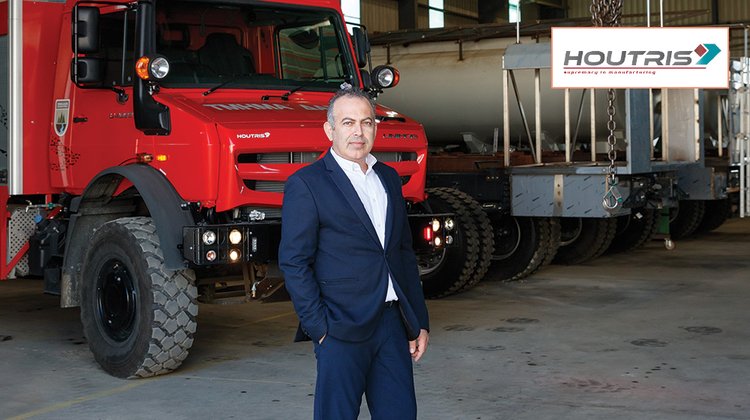Yiannis Houtris: Cyprus' defence cluster offers distinct advantages that allow it to compete effectively on the international stage
07:18 - 28 April 2025

For the past 40 years, Houtris has been designing and producing military-grade vehicles and specialised defence solutions, both locally and abroad.
The company’s product range includes upgraded military vehicles, mine-clearing and tactical vehicles, command and control vehicles, multipurpose defence platforms, aerial fire and rescue platforms for military use, custom fuel tanks and interchangeable modules that allow one truck to serve multiple battlefield functions.
Yiannis Houtris, the CEO of Houtris recently spoke to GOLD magazine about why the island's defence cluster, in spite of its relatively small size, offers distinct advantages that allow it to compete effectively on the international stage.
Our part of the world has long been defined by conflict and uncertainty. Why do you believe that it has now become important for Cyprus to invest in the defence sector?
In today’s geopolitical climate, Cyprus must strengthen its defence capabilities to ensure the country’s national security, enhance deterrence and boost technological and industrial growth to position it as a key defence hub in Europe. Beyond security, investing in the defence sector presents a major economic opportunity for the country, given its established industrial base, engineering expertise and advanced manufacturing capabilities. Cyprus is well-positioned to develop and expand its domestic defence industry, reduce dependency on foreign suppliers, attract international investment and partnerships in military technology and create new jobs, stimulating economic growth. While European defence R&D spending increased significantly – it reached €11 billion in 2023, more than double the amount spent in 2016 – the US and China still outspend the EU.
How does this disparity impact your ability to innovate and compete on a global scale? Are there any other structural issues on a European level that need to be addressed?
This spending gap leads to reduced access to next-generation defence technologies, increased reliance on foreign suppliers and slower innovation cycles for European defence firms. To maintain global competitiveness, European defence companies should leverage stronger cross-border collaboration, maximise funding opportunities from the European Defence Fund (EDF), enhance domestic production of advanced military technology and grow synergies between local markets and technologies.
On a local level, does the relatively small size of Cyprus’ defence cluster present challenges in competing with larger ecosystems or are there unique strengths you can leverage?
Despite its relatively small defence cluster, Cyprus offers distinct advantages that allow it to compete effectively on the international stage, including the ability to rapidly develop and customise mission-specific solutions and its strategic location, allowing it to be a key defence and security hub for the Eastern Mediterranean. Government investment is also driving growth in the sector and increasing local defence manufacturing capabilities. Most importantly, Cyprus possesses strong engineering expertise in the design and development of customised defence solutions. This technical capability, combined with government support and strategic industry partnerships, enables Cyprus to enhance its defence sector and play a more active role in the European security landscape.
Cyprus is strengthening its defence ties with nations like the US and France and aims to allocate 2% of its GDP to defence spending. Has this impacted your work? How can Cyprus become a key player in Europe’s defence ecosystem?
Cyprus’ growing defence alliances with the US and France, along with its commitment to allocating 2% of GDP to defence, have created major opportunities for the local defence industry. These developments have led to increased demand for defence solutions, enabling local companies to contribute to military modernisation and enhanced international cooperation, granting access to state-of-the-art military technologies. Also, new policy frameworks are improving procurement efficiency and production scalability. However, to fully integrate Cyprus into Europe’s defence ecosystem, there needs to be a more inclusive approach to EU defence procurement. Currently, larger European defence industries dominate the market, limiting opportunities for smaller but highly capable countries like Cyprus. We believe that Europe has an obligation to include all EU member states in its defence procurement portfolio. Establishing a policy that requires European nations to source a percentage of their defence purchases from every EU country – including Cyprus – would ensure fair competition and participation in the European defence industry. This strategy would also drive investment and development in emerging defence economies like Cyprus and enhance the EU’s overall strategic autonomy by diversifying its supply chain. Such a policy shift would serve as a strong motivation for Cyprus to continue expanding its capabilities, positioning the country as a key contributor in Europe’s defence ecosystem rather than a passive participant.
Finally, as drones, robotics and AI take centre stage in the theatre of modern warfare, what do you see as the next defining innovation?
The future of defence is being shaped by cutting-edge technologies that will redefine modern warfare. The key areas of innovation include drones and autonomous systems, which are used for surveillance, reconnaissance and combat, providing faster and safer operations. There is also artificial Intelligence (AI), which is enhancing battlefield decision-making, improving threat detection and response. Advanced robotics are supporting mine-clearing, bomb disposal and unmanned ground operations. We are actively investing in these next-generation solutions, ensuring that Cyprus stays ahead in military innovation while strengthening its defence capabilities for the future.
COLLABORATIONS
Houtris collaborates with local and international defence organisations to enhance military vehicles. In Cyprus, it works with the National Guard providing mine-clearing vehicles and it has also worked on projects in Greece and the UAE. For international clients, the company has developed custom military-grade tactical vehicles with enhanced combat features, including remotely operated water cannons and electro-hydraulic doors for military vehicles. Houtris has also collaborated with Mercedes-Benz Unimog to integrate advanced modular platforms that can adapt to battlefield needs.
This interview first appeared in the February edition of GOLD magazine. Click here to view it.

